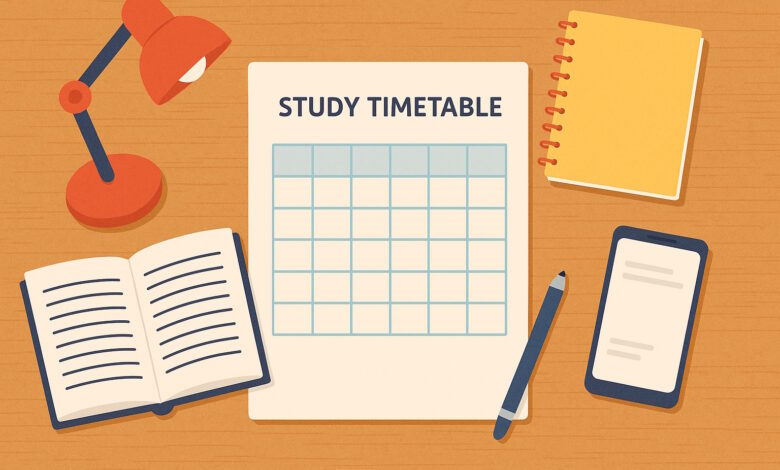How to Create the Perfect Study Timetable for Exams

Exams are a stressful time for almost every student. Whether you’re preparing for board exams, competitive exams like NEET, JEE, UPSC, or even semester exams in college – one thing that can truly make your preparation effective is a well-planned study timetable.
But the real question is – how do you create a study timetable that actually works?
In this article, we’ll walk you through a step-by-step guide to create the perfect study timetable, along with scientifically proven tips, Indian student examples, and realistic hacks that make it easier to follow. Let’s begin!
🧠 Why a Study Timetable is Important
A timetable is not just a schedule – it’s a discipline builder and your exam weapon. It helps:
-
Avoid last-minute panic
-
Divide syllabus into manageable chunks
-
Improve focus and consistency
-
Reduce stress and improve sleep
-
Save time and boost productivity
According to psychologists, a structured study plan enhances memory and long-term retention because our brain loves patterns and routine.
📅 Step-by-Step Guide to Create the Perfect Study Timetable
1. ✅ Know Your Syllabus First
Before creating a timetable, understand your complete syllabus. Break it into:
-
Topics (e.g., Algebra, Thermodynamics, History of India)
-
Units or Chapters
-
Easy, Medium, and Hard difficulty levels
➡️ Tip: Use your textbook’s index or official syllabus PDF from your board/exam website.
2. 🧭 Know How Much Time You Have
Count the number of days left until the exam and subtract:
-
School/College hours
-
Coaching classes
-
Sleep (7-8 hrs/day)
-
Breaks, meals, and family time
➡️ Now you’ll know your realistic daily study hours – usually 4–8 hours for most students.
3. 🎯 Set Your Study Goals
Ask yourself:
-
What do you want to finish this week?
-
How many chapters per subject should be done?
-
Do you need revision or practice tests?
Set weekly and daily targets.
🧩 Example:
Weekly Goal – Finish 4 chapters of Physics
Daily Goal – Study 2 hours of Physics, 1 hour of revision
4. ⏰ Choose the Best Study Time (Based on Your Brain)
Everyone has different peak energy times. Find yours:
| Time Slot | Best For |
|---|---|
| Early Morning (5-8 AM) | Theory-heavy subjects (Biology, History) |
| Late Morning (10-12 PM) | Problem-solving (Maths, Physics) |
| Evening (5-7 PM) | Reading, Revision |
| Night (8-10 PM) | Practice Papers, Light Reading |
➡️ Avoid long study hours at a stretch. Use the Pomodoro technique (study 25 min + 5 min break).
5. 📊 Divide Time Subject-Wise
Don’t spend all day on just one subject. Divide your day like this:
Ideal Subject Distribution:
-
Major Subject 1: 2 hours
-
Major Subject 2: 2 hours
-
Revision/Minor Subject: 1 hour
-
Practice Test/MCQs: 1 hour
🧩 Example for NEET aspirant:
-
2 hrs Biology
-
2 hrs Chemistry
-
1 hr Physics
-
1 hr Practice Test
6. 📆 Use Weekly Planning (Not Just Daily)
Daily plans can get disturbed easily. So plan weekly.
Sample Weekly Planner:
| Day | Subjects | Goals |
|---|---|---|
| Monday | Physics + Chemistry | Complete Laws of Motion + Organic Basics |
| Tuesday | Biology + Physics | Genetics + Numericals |
| Wednesday | Revision + Mock Test | Revise Class 11 syllabus |
| Thursday | Chemistry + Biology | Biomolecules + Inorganic |
| Friday | Weak Topics Focus | Any pending chapters |
| Saturday | Practice Paper | Full Syllabus Test |
| Sunday | Light Study + Family | NCERT Reading + Relax |
7. 💡 Keep Buffer Time for Emergencies
Sometimes, relatives visit or health issues come up. Keep buffer slots in your week for adjustments.
E.g., Sunday evening as a “catch-up” time for missed topics.
8. 🧘 Add Breaks, Sleep, and Fun
Studying non-stop causes burnout. Add:
-
Short breaks every 1 hour
-
Proper sleep (7–8 hours minimum)
-
Free time for phone, music, or walk
➡️ Your brain needs rest to retain what you learn.
9. 🖊️ Use Tools to Track and Stick to Your Plan
Use:
-
Google Calendar / Study Timetable apps (like Todait, MyStudyLife)
-
Sticky notes or printed planner
-
Daily journal to tick off tasks
10. 🔁 Revise Weekly and Update the Timetable
A timetable should be flexible. Every Sunday:
-
Review what was done
-
Move incomplete tasks to next week
-
Track improvement in mock tests or revisions
🧩 Success Tip: Students who adapt their plans weekly are 40% more likely to complete their syllabus on time.
📘 Sample Timetable for Class 10/12 Students (Board Exam)
| Time | Task |
|---|---|
| 5:30 AM | Wake up + Freshen up |
| 6:00–7:00 AM | Study Subject 1 (e.g., Science) |
| 7:00–8:00 AM | Revision (Last day’s topics) |
| 8:00–9:00 AM | Breakfast + School Prep |
| 9:00–2:00 PM | School Hours |
| 2:00–3:00 PM | Lunch + Power Nap |
| 3:00–4:00 PM | Study Subject 2 (e.g., Maths) |
| 4:00–4:30 PM | Break (snacks or walk) |
| 4:30–6:00 PM | Study Subject 3 (e.g., English) |
| 6:00–7:00 PM | Revision or MCQs practice |
| 7:00–8:00 PM | Dinner + Family time |
| 8:00–9:30 PM | Practice Sample Papers |
| 9:30–10:00 PM | Light reading + Sleep Prep |
🔥 Bonus Study Hacks (Scientifically Proven!)
-
Teach others – If you can teach it, you know it!
-
Mix subjects – Don’t study same subject for long hours.
-
Use flowcharts/mind maps – Easier to revise.
-
Digital Detox – Keep phone on silent during study blocks.
-
Eat memory-boosting food – Almonds, fruits, dark chocolate.
🙋 Frequently Asked Questions (FAQs)
Q1. How many hours should I study daily?
Ans: For board or competitive exams, 6–8 focused hours per day is ideal. Quality matters more than quantity.
Q2. What is the best time to study – morning or night?
Ans: Early morning is good for fresh learning. Night is better for revision. It depends on your personal preference.
Q3. Can I use my mobile phone for studying?
Ans: Yes, use it for online lectures, notes, or apps – but turn off distractions like notifications.
Q4. Is it okay to study at night?
Ans: Yes, but don’t sacrifice your sleep. Night owls should still aim for 7–8 hours of rest.
Q5. What to do if I miss my schedule for one day?
Ans: Don’t panic. Use buffer time or adjust next day’s plan. Focus on consistency, not perfection.
🎯 Final Words
Creating a perfect study timetable is not about strict rules – it’s about building a system that works for you. Once you create a flexible, goal-based routine and follow it with honesty, success is guaranteed.
Remember, even the best timetable is useless if you don’t follow it. So, start today, stay consistent, and believe in yourself. Your exams are just the beginning of your success story!
study timetable PDF for NEET, JEE, SSC, and Class 10/12 board exams is ready. You can download it using the link below: Custom_Study_Timetable



